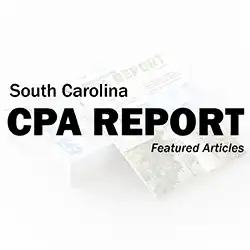Author: Jaclyn Veno, CPA
This article originally appeared in the Winter 2025 issue of the South Carolina CPA Report
he Professional Ethics Executive Committee (PEEC), a senior committee of the AICPA, is tasked with interpreting and enforcing the AICPA Code of Professional Conduct. This includes issuing interpretations that address emerging ethical challenges and guiding members in maintaining integrity, objectivity, and public trust. This article will examine four significant interpretations issued by PEEC: Assisting Attest Clients with Implementing Accounting Standards, Responding to Noncompliance with Laws and Regulations, Professional Qualifications or Competencies, and Fees. Each offers insight into how CPAs navigate ethical dilemmas in a dynamic professional environment.
Assisting with Implementation
Over the past decade, FASB and GASB have adopted a more principles-based approach to standard-setting, exemplified by the issuance of major standards such as CECL, Revenue Recognition, Leases, and SBITA. These complex standards have raised questions from members in public practice regarding the extent to which they can assist clients with implementation without compromising independence.
The “Assisting Attest Clients with Implementing Accounting Standards” interpretation (ET sec. 1.295.113), which was effective December 31, 2022, provides much-needed clarity. Members may engage in permissible activities such as developing training, researching standards, making recommendations, and drafting transition-related calculations to illustrate impact. However, independence is impaired if members assume management responsibilities, such as leading implementation efforts, setting policies, or designing internal controls. This interpretation allows members to provide valuable support to clients while upholding the profession’s core principle of independence.
Responding to Noncompliance with Laws and Regulations (NOCLAR)
The NOCLAR ethics interpretation outlines responsibilities for members encountering noncompliance or suspected noncompliance with laws or regulations (e.g., fraud, corruption, or public safety violations). The guidance is divided into two categories:
Members in Public Practice
If a member in public practice encounters or suspects NOCLAR, the member must comply with the “Integrity and Objectivity Rule”, notify management or those charged with governance of the issue, advise o corrective actions, and, if necessary, consider engagement withdrawal. For financial statement audits or reviews, they must understand the issue’s nature, evaluate management’s response, and document their actions thoroughly. If management fails to act appropriately, members should take further action as appropriate in public interest, including withdrawing from the engagement.
Members in Business
Members working in industry are expected to act decisively to address noncompliance within their organizations. Members in business must comply with the “Integrity and Objectivity Rule”, follow organizational protocols (e.g., ethics policies or whistleblowing mechanisms), and alert management or, when appropriate, those charged with governance of the employing organization to enable them to rectify, remediate, or mitigate the consequences of the identified or suspected noncompliance, or deter the commission of the noncompliance when it has not yet occurred. The guidance emphasizes the profession’s role in safeguarding stakeholders and maintaining public trust
In addition to this ethics interpretation, the AICPA’s Auditing Standards Board issued SAS 147, Inquiries of the Predecessor Auditor Regarding Fraud and Noncompliance With Laws and Regulations. SAS 147 requires an auditor, once management authorizes the predecessor auditor to respond to inquiries from the auditor, to inquire of the predecessor auditor regarding identified or suspected fraud or noncompliance with laws or regulation (NOCLAR). If the engagement is accepted, the auditor should document the inquiries of the predecessor auditor and the results of those inquiries. The NOCLAR ethics interpretation and SAS 147 are effective as of June 30, 2023.
Professional Qualifications or Competencies
Issued in September 2023, this interpretation addresses unethical behavior related to professional qualifications or competencies, such as CPE cheating scandals. Members violate the “Acts Discreditable Rule” if they engage in false, misleading, or deceptive acts, including:
- Sharing or disclosing exam questions or answers without authorization.
- Falsifying attendance at professional education courses.
- Tampering with exam administration or grading processes.
This interpretation underscores the importance of professional integrity, ensuring that CPAs demonstrate the competence and ethical conduct expected by the public and their peers.
Fees
The September 2021 interpretation on fees addresses ethical considerations in determining fees for attest engagements and the risks of fee dependency
Determining Fees
When setting fees for attest engagements, members must base their decisions on relevant facts and circumstances, excluding the provision of other services to the same client. Allowing such considerations would create self-interest and undue influence threats that impair independence. However, cost savings from prior experience with the client may be factored in without violating independence rules.
Fee Dependency
Fee dependency arises when a significant portion of a firm’s revenue comes from one client. If, over five consecutive years, fees from a single client represent a large proportion of total firm revenue, independence. is impaired unless safeguards are implemented. These safeguards include either having an independent reviewer outside their firm evaluate the attest work before the fifth-year report is issued, or after the attest report on the fifth year has been issued, an independent reviewer outside their firm needs to review the work before the issuance of the sixth year’s report. If total fees continue to represent a large proportion of firm revenue, the covered member must apply the safeguards in each subsequent year.
This interpretation, effective January 1, 2025, reinforces the importance of independence, particularly in cases of potential financial reliance.
In conclusion, PEEC’s recent ethics interpretations reflect the evolving challenges faced by CPAs in balancing their professional responsibilities with emerging complexities in the business and regulatory environment. Whether guiding members on assisting clients, addressing noncompliance, maintaining professional integrity, or ensuring independence in fee arrangements, these interpretations uphold the principles of the AICPA Code of Professional Conduct. By adhering to these guidelines, CPAs not only preserve their integrity and objectivity but also fulfill their essential role as trusted advisors to the public and the business community.

